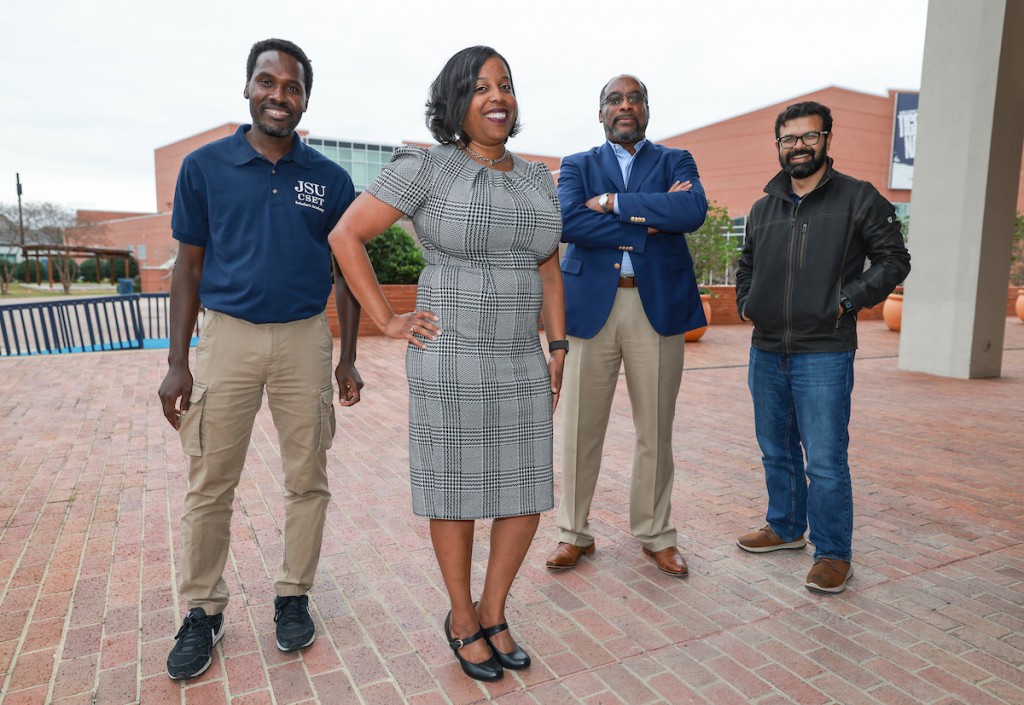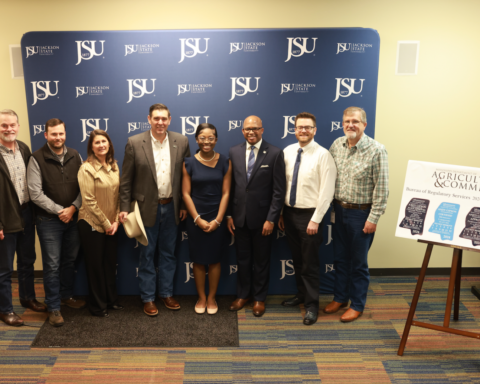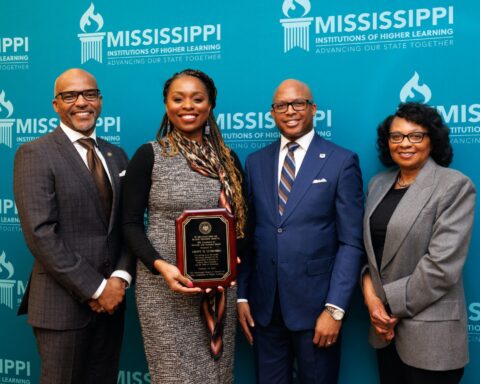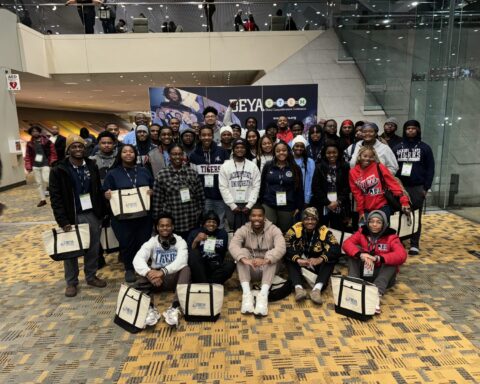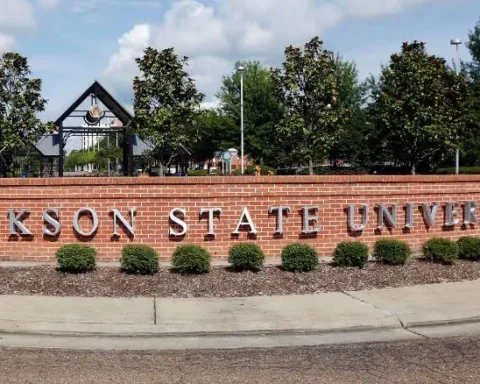Courtesy of Jackson State University
Jackson State University (JSU) experienced a dramatic increase of 90.96% in sponsored research funding for the 2022 fiscal year, far outpacing the previous cycle. The growth aligns with the ‘Elevate’ theme of JSU’s Strategic Plan, which notes that the institution “will raise the level of research prominence by leveraging our ‘high research activity’ status, increasing our research capabilities, growing strategic partnerships, driving innovation and economic development, and providing opportunities for faculty and students to engage in impactful collaborative research.”
The JSU Division of Research and Economic Development reports that the record $65,862,291 million in awards does not include funding from the Higher Education Emergency Relief Fund (HEERF) that was authorized as part of the coronavirus response. Adding that amount ultimately takes JSU’s 2022 FY total research revenue to over $101,684,095.
Joseph A. Whittaker, Ph.D., vice president of Research and Economic Development, touts the extraordinary success across the board.
“As research and technology advances continue to evolve, JSU is raising the bar of excellence,” said Whittaker. “We are delighted that major partners support the work and creativity of our faculty research teams. Our campus community has rallied around the president’s strategic plan to elevate and drive research excellence. We’re investing in research infrastructure; facilitating team science and movement of research from lab to market; supporting an environment for undergraduate and graduate research; and bringing greater visibility to our innovation activities.”
For the past two years, JSU has seen a steady increase in research awards. Many factors contribute to this growing trend, including a rise in the number of funded projects, upticks in principal investigators, patent approvals, career development opportunities, and incentivized research.
The Research Incentive Program encourages faculty to develop and secure externally funded research, scholarship and sponsored program projects. As a result, such efforts are expected to increase extramural proposal submissions, improve the success rate for extramural awards and augment the recruitment and retention of research-active faculty, staff, and graduate students. The incentive program is expected to increase institutional facility and administrative cost recovery and improve engagement and compensation for participating researchers.
President Thomas K. Hudson, J.D. hails the research faculty for their commitment to research excellence and scholarly advancement.
“I would like to commend our innovative researchers for their continued commitment to excellence and helping the university to elevate its research status,” said Hudson. “Our experts are publishing their research results in high-impact journals, conducting experiments in collaboration with national laboratories and R1 institutions, training the next generation of talented researchers, and engaging in technology commercialization with societal impact.”
Additionally, JSU has seen an increase in activities around innovation and commercialization, with faculty excited about the possibilities of getting tenure and promotion credit for engaging in innovation and entrepreneurship. For over two years, JSU has been highly active in the Promotion and Tenure in Innovation and Entrepreneurship (PTIE) project led by Oregon State University and funded by the National Science Foundation. The project, with its 80-plus coalition members, has adopted recommendations for expanding promotion and tenure guidelines to inclusively recognize innovation and entrepreneurial impact. This provides an additional incentive for researchers to translate their research from the lab to the market.
JSU has also increased its partnerships with federal agencies, other research institutions, industry, and community organizations, with intentional efforts to increase its research capacity and advance research and innovation to achieve societal impact. With over 180 funded projects in FY22, the research achievements are due, in part, to engagement of 22 new researchers serving as principal investigators.
Among JSU’s top-sponsored funding agencies are the U.S. Department of Education ($67,759,979 million); the U.S. Department of Health and Human Services ($9,999,938); the National Science Foundation ($6,316,124); the National Institutes of Health ($5,007,167); and the Engineer Research and Development Center of the Army Corps of Engineers ($1,446,250).
Highlights of selected research awards:
- U.S. Department of Health and Human Services:
○ $10 million to create a public health informatics curriculum to train and assist public health professionals in collecting scientific data for improving clinical and medical decisions.
- U.S. Department of Education:
○ $1.1 million TRIO Educational Center grant presented to Student Success and Title III to assist unemployed adults, low-wage workers and returning high school and college students to enter or continue a program of secondary education.
○ $250,000 to grow enrollment and retention of minority students in STEM.
- National Institutes of Health:
○ $2.4 million for the RCMI Center for Health Disparities Research.
○ $1.1 million to support the Jackson Heart Study Graduate Training and Education Center.
- National Science Foundation:
○ $1.6 million for the Louis Stokes Alliance for Minority Participation (LSAMP).
○ $954,604 to improve access to career and educational development for talented, low-income students through the flexible internship-research-education model.
- U.S. Department of Defense:
- $800,000 from the Engineer Research and Development Center of the Army Corps of Engineers to study the interaction of exopolysaccharide with multivalent cations and its effects on its structure on bioavailability in soils.
- $396,250 from the Engineer Research and Development Center of the Army Corps of Engineers for the JSU Cyber Security program.
- State and Local Government:
○ $2.8 million from the Mississippi Governor’s Office to improve health in Mississippi by creating a pipeline to the public health profession.
○ $2,038,589 from the Mississippi Department of Education to support activities to improve the Mississippi Teacher Residency Program in critical shortage areas.
- Foundations/Industry:
○ $700,000 from the W.K. Kellogg Foundation to develop a Digital Telemedicine Lab (Incubation Center Hub)
○ $650,000 from the Mellon Foundation to build the capacity of the Margaret Walker Alexander Center.
JSU also boasts several research and innovation accomplishments.
Two faculty inventors in the Department of Chemistry, Physics, and Atmospheric Sciences were each awarded $150,000 through the state of Mississippi’s Strengthening Mississippi Academic Research Through Business Act (SMART Business Act) Business Accelerator Initiative. The initiative is designed to support university research and the development of the state-owned intellectual property into products and services. Shan Yang, Ph.D., assistant professor, has developed a portable prototype for his CariesFinder. It’s a Raman imaging system designed to detect early-stage dental caries. Patent number: US 10,876,972 B2. Also, Victor Ogungbe, Ph.D., associate professor, is conducting studies to develop an early-stage drug that would inhibit emerging and debilitating mosquito-borne alphaviruses such as equine encephalitis. (Patent Pending).
Two National Science Foundation CAREER awards were also awarded to JSU researchers. Yongfeng Zhao, Ph.D., an assistant professor in the Department of Chemistry, Physics, and Atmospheric Sciences, received a CAREER award to study the harnessing of continuous growth mechanisms to synthesize water-soluble magnetic nanoparticles for magnetic particle imaging. Zhao has a patent pending for his research with water-soluble iron oxide nanoparticles. It focuses on delivering timed-release dosages of medicines such as chemotherapy while mitigating side effects and avoiding damage to healthy cells. Additionally, the CAREER award presented to Sadik Khan, Ph.D., assistant professor in the Department of Civil and Environmental Engineering, focuses on advancing the study and use of vetiver grass for preventing slopes from falling, a project that is instrumental in solving sloping and landslide problems in Mississippi.
Meanwhile, Jackson State continues to bolster its footprint in public health.
Girmay Berhie, Ph.D., a professor in the CEPH-accredited School of Public Health, received a $10 million cooperative grant from the U.S. Department of Health and Human Services, Office of the National Coordinator (ONC) for Health Information Technology. The Public Health Informatics and Technology (PHIT) Workforce Development Program expects to build an expanded U.S. workforce that is better capable of responding to future public health and biological threats.
Brandi Newkirk-Turner, Ph.D., associate provost and professor in the Department of Communicative Disorders, was awarded four major grants: COVID Champions for $717,000; $1,064,708 CALIPSO grant (over five years) related to communicative disorders from the U.S. Department of Education; $2.8 million from the Mississippi Governor’s Office for improving health in Mississippi by creating a pipeline to the public health profession; and $280,000 from the Woodward Hines Foundation to redesign the general education pathway, advance educational equity and remove barriers.
Researchers at Jackson State University continue to conduct research with great societal and economic development impact. JSU will continue to explore new partnership opportunities, engage more faculty and students in research, and emphasize capacity building to position the institution for sustainable growth and productivity.

